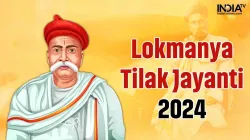Lokmanya Tilak Jayanti 2024: 10 facts about Bal Gangadhar Tilak that may interest you
Bal Gangadhar Tilak's contributions to India's freedom struggle and social reforms have left an indelible mark on the nation's history. As we celebrate Lokmanya Tilak Jayanti 2024, it is essential to remember and honour his legacy.

Every year on July 23, India commemorates the birth anniversary of one of its greatest freedom fighters and social reformers, Bal Gangadhar Tilak. Known as Lokmanya Tilak, he played a pivotal role in India's struggle for independence. As we celebrate Lokmanya Tilak Jayanti 2024, here are ten fascinating facts about this remarkable leader that highlight his contributions and legacy.
Early Life and Education:
Bal Gangadhar Tilak was born on July 23, 1856, in Ratnagiri, Maharashtra. He was a brilliant student and completed his education in law. He also earned a degree in mathematics from Deccan College in Pune.
Title of 'Lokmanya':
Tilak was given the honorary title of 'Lokmanya,' which means 'accepted by the people as their leader.' This title was a testament to his immense popularity and the trust people had in his leadership.
Father of Indian Unrest:
Tilak was often referred to as the "Father of Indian Unrest" by the British colonial authorities due to his radical approach and his emphasis on Swaraj (self-rule). His famous declaration, "Swaraj is my birthright, and I shall have it," became a rallying cry for the Indian independence movement.
Founding of Educational Institutions:
Tilak was a strong advocate for education. He founded several educational institutions, including the Deccan Education Society in 1884, which aimed to provide quality education to the youth of India and instil a sense of national pride and social responsibility.
Editor and Journalist:
Tilak was an influential journalist and used his writing to inspire and mobilise the masses. He started two newspapers, 'Kesari' in Marathi and 'The Mahratta' in English. Through these publications, he propagated his nationalist ideas and criticised British policies.
Advocate of Social Reforms:
Tilak was deeply concerned about social issues and worked towards reforms in Indian society. He supported widow remarriage, opposed child marriage, and advocated for women's education, understanding the importance of social progress alongside political freedom.
Role in the Indian National Congress:
Tilak was a key figure in the Indian National Congress and played a crucial role in its activities. He was part of the Lal-Bal-Pal triumvirate, along with Lala Lajpat Rai and Bipin Chandra Pal, which represented the extremist faction within the Congress. They advocated for more radical measures in the struggle for independence.
Ganesh Utsav and Shivaji Jayanti:
Tilak popularised the celebration of Ganesh Chaturthi and Shivaji Jayanti to unite people and inculcate a sense of pride in Indian culture and history. These festivals provided a platform for political discussions and mobilisation against British rule.
Imprisonments and Trials:
Tilak's uncompromising stance against British rule led to several imprisonments. He was tried for sedition multiple times and spent considerable periods in prison, including a six-year term in Mandalay, Burma (now Myanmar). Despite these hardships, he remained steadfast in his commitment to the cause of freedom.
Literary Contributions:
Tilak was also a scholar and author. His works include the famous book "Gita Rahasya," an interpretation of the Bhagavad Gita, which he wrote during his imprisonment in Mandalay. The book reflects his philosophical thoughts and his belief in karma and duty.